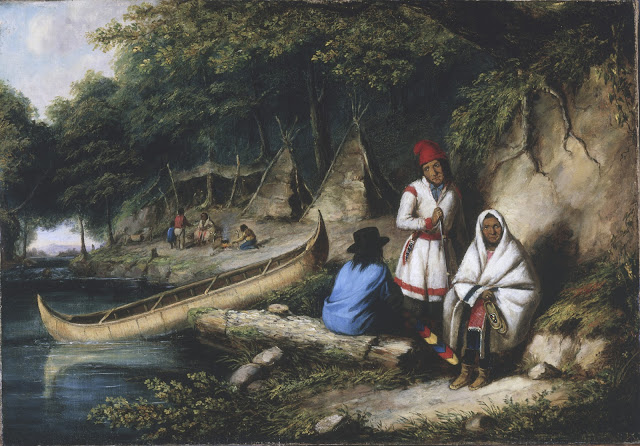Another off-season project I have been gradually working is a leather sling seat for the
15ft cedar canvas canoe. Paddling solo means kneeling as close to the center point of the canoe as possible. With my shorter, symmetrical 14foot canoe, the bow seat is perfectly positioned to paddling the canoe "backwards" so that my rump can rest on the edge of the seat and take weight off the heels if needed. With this option and full kneeling on the bottom of the hull, paddling the 14 footer is a joy.
The longer 15ft cedar canvas logically has its seats positioned further towards the ends of the canoe and paddling in reverse while resting on the bow seat results in an awkward stern heavy position when the boat is unloaded. So a solution was in order. I considered the idea of adding a permanent kneeling thwart but then wanted to explore a more removable option - hence the pursuit of a personalized sling seat.
Tom Seavey of Azland Traditions is the creator of
Original Saddle Seat. I've seen a few first hand at some canoe gatherings and have always admired the quality leather workmanship. Here's shot of one I took at the
WCHA Assembly held in Peterborough back in '08

Original Saddle Seat by Azland TraditionsI'm assuming this design was meant to be used as true seat with folks sitting while paddling...it is quite wide and sturdily built. Since I was making a sling seat for exclusively kneeling, I figured that the dimensions could be narrower.
While Tom's design is stunning, there was one more issue I had with my personal style of paddling. After maybe an hour or so paddling on one side, I might switch sides and heel the boat the other way to give muscles a needed break. This means the seat would need to be able to slide from the extreme port to extreme starboard side of the boat. Tom's design with its 4 independent straps doesn't allow for instant adjustment. The buckles would need to be undone and the seat repositioned each time.
Another option was for the seat to "ride" on webbing straps tied to the inwales.
Stewart River Boatworks sells a canvas canoe seat with webbing that looks promising as well but hand stitching waxed canvas isn't my idea of fun.

Stewart River Canvas Canoe SeatEventually, I came across
BigBlue's post on WildSurvive featuring a pic of his homemade sling seat made of a combination of leather and webbing straps.

BigBlue's Leather Sling SeatHis design with two layers of leather laced together riding on webbing straps strung across the boat fit the bill. I didn't have enough leather on hand to mimic his design and wasn't crazy about the lacing idea.
So my own version involved a 8" wide by 20" long piece of veg tan leather along with two 6ft long, 1-1/2" wide straps to sling across the inwales. The straps would be fashioned into a simple belt. To prevent the edge of the leather seat from digging into the skin, I thought I would fold over the edges and lace them in place by playing around with some grommets and scrap piece of leather lace.

8"x20" piece with grommets

Edges folded in and tightened with laceLeather is a suitable medium for pyrography and like my
EBook cover made a while back, I obviously wanted some canoe related theme. I was aiming for a sort of old-fashioned, western look with a paddler & bark canoe rather than a typical horse & rider scene. After finding some clipart on the web, here is my adaptation.

Burned decorationOf course the leather gets darker when stained and treated with waterproofing finishes but here is the completed project...

Finished saddle seatBefore the very late freezeup of the lake this year, I got the chance to try out the sling seat on a short jaunt. Here's how it looks on strapped in...

Buckled into the boatBecause of the rib positions and the dimensions of the actual seat, the belt straps don't end up running parallel so the seat can't slide completely side to side as originally intended...oh well. I also seemed to have lost one belt keeper loop that keeps the straps nice and taught at the inwale, but all in all, it worked well. I ended up moving it one rib location further astern than the pic after giving it a trial run and this allowed to get into a full kneeling position behind the centre thwart if I wanted to and then quickly come up onto the seat if needed. Overall, it was more than sufficient to support my (ever growing) weight and is comfortable enough when paddling in the kneeling position to keep the weight off the heels. Plus, being a not permanent and removable accessory, it can be taken off and put into another canoe if needed.


































